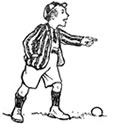What should I do when other kids are rude?
/When I take my three-year-old to a park or a special place--like a kids' museum--I try to make him behave just the way he would at school or at home. But what about other people's kids? If they grab things out of my child's hands, or slug him, what do I do? Scold them? Send angry looks at their parents who are ignoring the behavior or are nowhere to be found? Help!
Even though three-year-olds have far more ability to control themselves than do toddlers, they are still unlikely to behave well for very long without adult help. Most three-year-olds have learned that it’s not O.K. to hit, shove, grab, or destroy, but at times they may not be able to cannot stop themselves--unless they remember that if they don't, a grown-up will.
When a three-year-old is at home or in pre-school, he is pretty sure what the rules are that he is supposed to follow and that makes it easier to behave. But when you take him out to a new park or special place, the rules that he follows may be different than the ones other children have been taught. For example, some adults feel that it's better for young children to learn to work out conflict with minimal adult help (unless someone is being hurt) while others believe that children work out conflicts best with adult guidance. Some adults don't worry too much about children grabbing or refusing to share, while others feel that these behaviors are unacceptable even if the children are otherwise getting along fine. So one parent might intervene while another will sit back and say, "Oh, they're just being kids."
Parents sometimes evolve a style of supervision that suits their own child's temperament but may not take into account how other children react to the same situation. For example, the parent of an easy going child who reacts mildly to frustration or who asks for help when she needs it may not feel that her child needs too much close supervision. Another parent might have learned that her child, once frustrated, tends to get angrier and more unhappy unless an adult helps her to put her feelings into words. Many children need coaching to help them handle social situations, and the coach has to be watchful to intervene as needed.
If you feel that your child needs your help you should act on his behalf, even if the other adults don't feel the same way. You know your own child best, and your friends' child rearing philosophies are probably based on what they think works best for their families, not yours. However, it may be better to quietly go about your own parenting without making any comments about other children's behavior. Most parents don't mind if another parent gets involved unless feel they are being criticized. If you must stop another child, keep your voice gentle and don't scold, or the child’s parent will feel scolded as well!
You’re also asking about situations where other parents aren't close by or are distracted by conversation with other adults. That’s a trickier problem. When three-year-olds play they may need help in working out conflicts with words. If an adult isn’t there to assist, it's not surprising when a scuffle breaks out. If you find yourself as the only adult in the sandbox with a group of pre-schoolers, your choices are limited. You can't really call the adults in to watch if everyone is getting along, because there's no apparent reason. But if you simply wait and watch yourself, something will probably happen, and whatever happens may include your child. Probably the best action to take is to station yourself close to your child so that you can keep a watchful eye on the interactions around him. Engage with the children playing nearby. Talk to them, play with them a little, and let them know that you're the parent in charge. If you don't feel comfortable with a child's behavior, redirect him or mildly ask him to stop. Most three-year-olds will either do what a strange grown-up asks or move away from you and your child!
When you are on the way home from an activity, part of your talking with your child about what he did can include talking about what other children did. Rather than criticizing other kids or their parents, you can ask your child if another child's behavior would be allowed at pre-school. If your child says "no", you can ask him what the rule is at school. and why they have that rule. In that way, you can talk to your child generally about rules and how you think children should act, without getting too judgmental. Remember, for all you know, the next time your child goes to the park he may be the one who pushes, grabs or shoves the moment your back is turned!
